#capitalist appropriation
Explore tagged Tumblr posts
Text
rbing this again cuz I've watched it now and it's super-great! I had thought I'd been following this story pretty closely but there are elements of it Sophie covers here I hadn't heard of yet. Also, she goes into how behavior like Holmes's is less personal than systemic; how it is RIFE in capitalist subcultures like startup, and how the myths, "incentives", and "discipline" of capital pressures people into it even within supposed philanthropic spaces. A really informative, funny, and tragic video essay.
youtube
New Sophie From Mars video!
Pressure, Prodigy and Profit: a look at Theranos and Elizabeth Holmes is a critical analysis of the biomedtech startup that garnered 9 billion dollars in venture capital backing despite never once having a working product. I also talk about my own work history in tech startups, and take a wider view of startup culture as a uniquely capitalist sickness.
https://youtu.be/CKUxFa_FEeU
#sophie frm mars#Video Essays#Theranos#Elizabeth Holmes#Pressure Prodigy and Profit#Capitalism#Politics#Management Culture#Startup Culture#Trauma#Abuse#Capitalist Appropriation#Testimonials#appreciative reblogs#previously on Racing Turtles
139 notes
·
View notes
Text
Let's learn about the Quaker Oats brand:
The Quaker Oats company is not a Quaker (Religious Society of Friends) company nor founded by them; a thread:
With the current renaming and changing the logo of the Aunt Jemima line, owned by the Quaker Oats company, I'm going to take the time to address one of the most common associations with Quakers.
Quakers were considered good to do business with as they are honest and value integrity. The company adopted the name, "Quaker", in order to attract more business. The founders weren't Quakers themselves.
The logo for the company, now easily recognized, was drawn as a man in what was called "typical Quaker garb" - but resembles the dress of the Puritans in the 1800s. Many Quakers in the 1800s wore "plain dress" and would dress more simply.
In the mid 1900s, the company carried out experiments on mentally disabled children (without the parents informed consent) with a couple of universities. The experiments were supposed to study how minerals in cereals were metabolized.
The children were unknowingly fed food with radioactive calcium and iron! The parents of the children later sued and the lawsuit was settled in 1997.
In 2010, a class action lawsuit was filed against the company for dishonest advertisements. The company marketed their products as healthy, but had food that contained trans fats. They didn't ban/remove trans fats until 2014.
There's a lot more to the story, but this is just a sample of how the company is not Quaker and doesn't follow Quaker values. While Quakers participated in the Underground Railroad, the Quaker Oats co. is only now rebranding a racist brand.
19 notes
·
View notes
Text
(Questionnaire on a job application)

Do you guys think I’m getting the job
3 notes
·
View notes
Text
"cultural analysis" youtubers read something that isn't a medium/vouge/vox op-ed as research challange
#creating a new aesthetic called echo chamber core#edit. started thinking about it and actually i think my head died during the aesthetics vs subculture vid why did i watch that.#the bizzare way it ostensibly sets out to critique subcultures reduction to “fashion” or whatever while entirely reducing the concept of#subculture to fashion throughout the video. the seemingly willful misunderstanding of subculture studies origins to make a cheap crack#about 1920s cultural studies “not being interested in women” (also: not true).#the fact that its a 40 minute long video on aesthetics that never once mentions nazism but has a shout out to cottagecore being a positive#new subcultural group.#the annoyance at calling light blue nails “blueberry milk nails” as a “trendy signifier” when that type of naming is exactly like whats#on an actual nail polish bottle. just. the level of internet brain that is unble to fathom subcultures still existing outside the internet#or the idea that fashion isn't always the primary expression of subculture.#the circular fashion brained argument that “how you dress can no longer be counter cultural or revolutionary because everyone can buy a#shein dupe miu miu skirt now"#while acknowledging that working class brittish people's participation in subculture (for instance)#did not improve their financial or social situation#but at the same time not mentioning the arguably inherent fashion marketing origins of punk fashion.#the insistence on constantly citing one single person of origin for internet trends.#the reoccurring narrative of claimed “deeper capitalist critiquing“ fashion movements being ”co-opted“ and appropriated as#”less deep“ fashion marketing trends by big fashion inc. as if that kind of#posture of anticapitalist agenda and confusing pseudo intellectualism (health goth manifesto) isn't commonly occuring in fashion marketing.#like people dont walk down fashion week runways wearing tulle maxi dresses spelling “fuck capitalism”.#or žižek didn't write copy for an a&f mag#recuperation 101
16 notes
·
View notes
Text
via 'mobile art notes' :
leon "sea turtle" kennedy. strangled by that funky cellophane shit used in warehouses
#got moved to a different area and i can finally daydream because im not in agony#it's boring work but it ain't bad#worse that happens is my lower back hurting but im used to that#not constant 8 hour movement so it don't last#i was able to scribble many notes and creatures during my breaks after daydreaming bout em on the floor#factory work isn't bad if it's not an overload on your body#tho my lead works herself too hard and im trying to convince her she don't gotta care this much#she's the lead and im new sure but oof she's too hard on herself#aint worth worrying for the capitalists quotas tbh#unless you really wanna go crazy and that makes you happy meh whatever#i go a little above and beyond with cleaning up and organizing but that#is for the benefit of coworkers#shit is so disorganized...#rant about work but sea turtle kennedy might get drawn lmfao#the chains hanging from the huge ceiling and the storage area for the warehouse.... inspiring...#dark as fuck down those halls but motion activated lights lol#thinkin bout simmons chokin him out cuz he's got mob boss vibes and that feels appropriate for the idea
4 notes
·
View notes
Text
Just had a take so bad on a post crossing through my dash and… yeah. I DO want that “👎” button here. I really DO.
#wtaf#no#hell no!#don’t appropriate my culture as you please#use your fucking founder fathers you weak-ass capitalist babies!
0 notes
Text

As an alum, is this really appropriate?
#As an alum#is this really appropriate?#kent state university#kent state#university#universities#class war#appropriate#alumni#alum#eat the rich#eat the fucking rich#education#school#capitalism#anti capitalist#capitalist hell#capitalist dystopia#capitalist bullshit#ausgov#politas#auspol#tasgov#taspol#australia#fuck neoliberals#neoliberal capitalism#anthony albanese#albanese government#oppression
0 notes
Text
youtube
Just me and these guys.

#stopmotion#robert morgan#not true two more people showed up#I drove an hour to get there and things were capitalist bleak out there in Dublin#all appropriate to the venture#this movie had everything
0 notes
Text
I’ll have to wait to watch this when I can give it my full attention, but kurzgesagt is funded partially by Bill Gates, who heavily promotes green growth and invests in carbon capture technologies. Bill has also said that “we can’t expect people to change their lifestyles for climate change” and essentially wants to continue our consumerist culture with a green facade.
Of course I haven’t watched this yet, so it could be a great video! But it’s important to keep in mind the biases kurzgesagt has when it comes to climate change, and especially since solarpunk has begun to be appropriated by green capitalists since becoming more popular.

Aside from the physical limits of the universe there is nothing stopping us from creating a literal paradise for ourselves. If we dare to tell ourselves a different story about who we are and who we could be. - from Is Our World Broken? by Kurzgesagt
#genuinely going to watch later and write out my thoughts on my own post#but green capitalist appropriated solarpunk tends to disregard intersectional environmentalism#and consumerist culture and rewilding#basically upholding the status quo with a green facade#ultimately keeping western countries on top while still keeping colonized countries at the bottom
149 notes
·
View notes
Text
Any analysis of fascism that posits the USA in 1776 as a fascist state is one where 'fascism' is just an edgier way to say 'capitalism' - what capitalism isn't fascist, in this view; and what's the purpose of the term in that case?
Fascism is a specific formulation of capitalism which emerges when the capitalist system is in extreme crisis (specifically a crisis of entrenched fixed capital devastating the rate of profit). It is characterised by the extension of imperial methods to the population of imperial core itself - an autocannibalism when all other sources of profit have dried up - and the mobilisation of the petty-bourgeoisie. It explicitly borrows the methods of settler-colonialism to apply not only to its colonies, but also to itself. Fascism is not simply 'when genocide happens' - capitalism under liberal-democracy carries out genocide just as well.
In this regard it is essentially appropriate to say that fascism has been superfluous in the USA - a fascist movement has historically never been able to seriously gain ground in the USA because the needs of fascism are already met by straightforward settler-colonialism. There has been no deep crisis to spur on fascism, and no need to divide the populace and expropriate some portion of it, because the USA already has an exploitative and expropriative relationship with its internal colonies. This arrangement is not fascist, it is straightforwardly colonial.
There can only be a real fascist movement and fascist state in the USA if two conditions are met: 1) the settler state can no longer wring enough profit out of the exploitation of the indigenous and black peoples; and, 2) serious economic failure and crisis threatens the existence of capitalism, by inspiring popular revolt and communist organisation.
847 notes
·
View notes
Text
PLEASE JUST LET ME EXPLAIN REDUX
AI {STILL} ISN'T AN AUTOMATIC COLLAGE MACHINE
I'm not judging anyone for thinking so. The reality is difficult to explain and requires a cursory understanding of complex mathematical concepts - but there's still no plagiarism involved. Find the original thread on twitter here; https://x.com/reachartwork/status/1809333885056217532
A longpost!

This is a reimagining of the legendary "Please Just Let Me Explain Pt 1" - much like Marvel, I can do nothing but regurgitate my own ideas.
You can read that thread, which covers slightly different ground and is much wordier, here; https://x.com/reachartwork/status/1564878372185989120
This longpost will; Give you an approximately ELI13 level understanding of how it works Provide mostly appropriate side reading for people who want to learn Look like a corporate presentation
This longpost won't; Debate the ethics of image scraping Valorize NFTs or Cryptocurrency, which are the devil Suck your dick
WHERE DID THIS ALL COME FROM?
The very short, very pithy version of *modern multimodal AI* (that means AI that can turn text into images - multimodal means basically "it can operate on more than one -type- of information") is that we ran an image captioner in reverse.


The process of creating a "model" (the term for the AI's ""brain"", the mathematical representation where the information lives, it's not sentient though!) is necessarily destructive - information about original pictures is not preserved through the training process.


The following is a more in-depth explanation of how exactly the training process works. The entire thing operates off of turning all the images put in it into mush! There's nothing left for it to "memorize". Even if you started with the exact same noise pattern you'd get different results.

SO IF IT'S NOT MEMORIZING, WHAT IS IT DOING?
Great question! It's constructing something called "latent space", which is an internal representation of every concept you can think of and many you can't, and how they all connect to each other both conceptually and visually.

CAN'T IT ONLY MAKE THINGS IT'S SEEN?
Actually, only being able to make things it's seen is sign of a really bad AI! The desired end-goal is a model capable of producing "novel information" (novel meaning "new").
Let's talk about monkey butts and cigarettes again.

BUT I SAW IT DUPLICATE THE MONA LISA!
This is called overfitting, and like I said in the last slide, this is a sign of a bad, poorly trained AI, or one with *too little* data. You especially don't want overfitting in a production model!
To quote myself - "basically there are so so so many versions of the mona lisa/starry night/girl with the pearl earring in the dataset that they didn't deduplicate (intentionally or not) that it goes "too far" in that direction when you try to "drive there" in the latent vector and gets stranded."
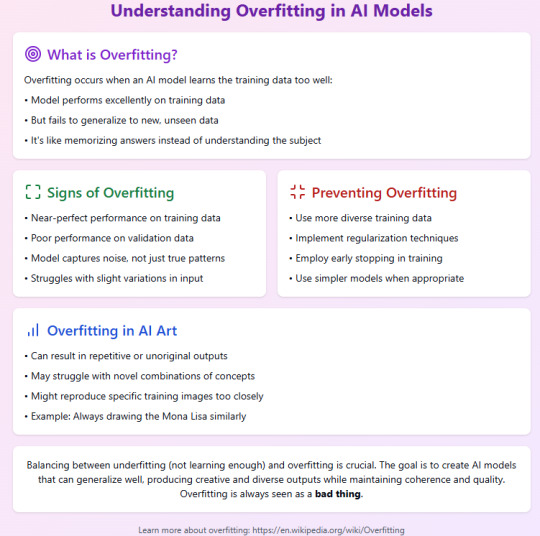
Anyway, like I said, this is not a technical overview but a primer for people who are concerned about the AI "cutting and pasting bits of other people's artworks". All the information about how it trains is public knowledge, and it definitely Doesn't Do That.
There are probably some minor inaccuracies and oversimplifications in this thread for the purpose of explaining to people with no background in math, coding, or machine learning. But, generally, I've tried to keep it digestible. I'm now going to eat lunch.
Post Script: This is not a discussion about capitalists using AI to steal your job. You won't find me disagreeing that doing so is evil and to be avoided. I think corporate HQs worldwide should spontaneously be filled with dangerous animals.
Cheers!
687 notes
·
View notes
Text
Sociology should be a mandatory course for all STEM students. The amount of people that think we just need "technology” to solve all our problems is frankly scary. Take basically any problem we face today and the root cause is always societal. You could create some magical new technology that creates 100% free and clean electricity with no cost to operate it or to distribute it, and the capitalists will still find a way to monopolize and monetize it. You could make a miracle machine that builds houses out of thin air at no cost and we'd still have a housing crisis. You can completely automate the production of absolutely everything and people will still have to spend 90% of their life working for pennies to survive. Every time we've developed some new technology that's meant to make our lives better the capitalists just used it to further consolidate their power. Advancement in technology without appropriate societal changes don't make things better. You can go back to 100AD and give Romans all the modern weapons and medicine and fertilizer and shit, and the Roman empire will still fall, because they'll just continue killing each other in constant civil wars and resulting famines and plagues, except now they'll do it with F16s.
1K notes
·
View notes
Text
#i am shooting laser eyes directly at shonen jump with their barbaric working conditions and crunch times. they are the true enemy
Say this on discord repeatedly but so viscerally real


(Mystic Code Book Chapter 5 | "Tracks to the Neverland" December 2020 Exhibition Interview)


(TPN Wiki Page on Chapter 134 | @TPNManga's translation of WSJ's Editorial Department Note)

(October 2020 Series Completion Commemorative Interview)





(Discussion of Dragonball author Akira Toriyama's and One Piece author Eiichiro Oda's work schedules | Sample Schedule of an Anonymous Weekly Mangaka | Naruto author Masashi Kishimoto's typical schedule)




(Notes by @1000sunnygo on this post)
This is why I personally can't fault Shirai for ending the series when he did while trying to maintain his sense of artistic integrity, even with my complaints about the back half of the series.
escape arc is easily the best tpn arc and there are critiques to be had about the pacing in later arcs but if you say everything post-escape is unoquivocally bad you are simply wrong and dumb i'm so sorry
#we are in desperate need of healthier work cultures this shit is fucking insane#“but they're self-employ—” any work culture that coerces people into this mindset at the cost of their health to get anywhere is horrid#capitalist hell world timeline#also one of the appropriate times to cite the TPN wiki#TPN Interviews#Shounen Jump#Kaiu Shirai#Escape Arc#King of Paradise Arc#Seven Walls Arc#Imperial Capital Battle Arc#Return to Grace Field Arc#Human World Arc#1000sunnygo#goldiipond#FSS Chatter#One Piece#Naruto#Masashi Kishimoto#Eiichiro Oda#Hiroshi Shiibashi#Akira Toriyama
15 notes
·
View notes
Text
I think that the average internet Marxist is actually not much of a materialist at all, in fact in their behavior and rhetoric they seem very concerned with moral purity, the redemptive power of suffering, and the ability of narrative to shape the actual world. As myriad as the senses of the word "materialist" have come to be, none of this would seem to comport well with any of them. This all feels very Christian.
In some cases I really do think there is a latent Christianity in it, but I think the stronger source of this trend is simply the leftist emphasis on sloganeering. Somewhere along the line, maybe with the Bolshevik policy of democratic centralism or maybe somewhere else, the importance of the slogan, the party line, the supreme power of the speech act seems to have been elevated for many leftists above all other concerns. From this follows the kind of disingenuous, obviously fallacious argument you so often see from the online ML left. The point is to say the magic words that have been carefully agreed upon, the magic incantation that will defeat all opposition.
Whether it's "I don't want to vote for a candidate who supports any amount of genocide" or "The Is-not-rael Zionist entity is on the edge of collapse!" or whatever else, a rational person can recognize the impotence of these words. They don't do anything. They're just words. But the feeling seems to be that once the perfect incantation is crafted—the incantation that makes your opponent sound maximally like a Nazi without engaging with their position in good faith, or the incantation which brushes aside all thoughts of defeat, or whatever else—once the perfect incantation is crafted, all that is left to do is say it and say it and say it, and make sure everyone else is saying it too.
This is not a materialist way of approaching politics. This is a mystical way of approaching politics.
I think it's also worth saying that this tendency in Marxism seems old, it certainly predates the internet. Lots of Marxists today are vocal critics of identity politics, of what they see as the liberal, insubstantive, and idealist Diversity, Equity, and Inclusion framework. I share this criticism to a significant degree, but I'm not very eager to let Marxists off the hook here. The modern DEI framework evolved directly out of a liberal/capitalist appropriation of earlier academic ideas about social justice from such sources as Queer Studies, Black Studies, academic Feminism and so on. I say this as a neutral, factual description of its history which I believe to be essentially accurate. In turn, disciplines like Queer Studies, Black Studies, and academic Feminism each owe a great intellectual dept to academic Marxism, and likewise to the social movements of the 1960s (here in the Anglosphere), which themselves were strongly influenced by Marxism.
Obviously as the place of these fields in the academy was cemented, they lost much (most) of their radical character in practice. To a significant degree however, I think their rhetorical or performative radicalism was retained, and was further fostered by the cloistered environment of academia. In this environment the already-extant Marxist tendency to sloganeering seems in my impression to have metastasized greatly. And so I think the political right is not actually wrong, or not wholly wrong, when they attribute the speech-act-centrism of modern American (and therefore, online) politics, its obsession with saying things right above doing things right and its constantly shifting maze of appropriate forms of expression, at least in part to Marxism.
Now I should say that I don't think the right is correct about much else in this critique, and I also don't think this is wholly attributable to Marxism. But I think there's plainly an intellectual dept there.
More than anything else, this is my genuine frustration with both Marxism as it exists today and with its intellectual legacy as a whole. I fundamentally do not believe in the great transformative power of speech acts, I do not believe in the importance of holding the correct line, I do not believe that the specifics of what you say or how you say it matter nearly as much as what you do. I do not think there is much to be gained from playing the kind of language games that Marxists often like to play, and I do not think that playing language games and calling it "materialist analysis" is a very compelling means of argument.
246 notes
·
View notes
Text
patience being tested. being forced by a bizarre unfortunate situation to adhere to university requirement technicality by taking this simple basic elementary "introduction to environmental history" class.
this class is from facilitators/program which do, like, "history of the American frontier" or "history of fishing and hunting" and still basically subscribe to that old-school twentieth-century idealization and celebration of characters like Teddy Roosevelt and reverence for a mythical arc-of-history-bent-towards-justice narrative of the often-clumsy but ultimately-benevolent US federal government and its mission to "save nature" through the miracle of "sustained yield," while heroic federal land management agencies and "heritage" institutions lead to way, staffed by exceptional individuals (appeals to nostalgia for the frontier and an imagined landscape of the American West; ego-stroking appeals to flattering self-image that center the environmentalist or academic). where they invoke, y'know, ideas like "ecology is important because don't you enjoy cross-country skiing in The Woods with your niece and nephew? don't you like hunting and fishing?" which makes it feel like a time capsule of appeals and discourses from the 1970s. and it invokes concept of "untouched wilderness" (while eliding scale of historical Indigenous environmental relationships and current ongoing colonial violence/extractivism). but just ever-so-slightly updated with a little bit of chic twenty-first-century flair like a superficial land acknowledgement or a reference to "labor histories" or "history from below," which is extra aggravating when the old ideologies/institutions are still in power but they're muddying the water and diluting the language/frameworks (it's been strange, watching words like "multispecies" and "Anthropocene" over the years slowly but surely show-up on the posters, fliers, course descriptions, by now even appearing adjacent to the agri-business and resource extraction feeder programs, like a recuperation or appropriation.) even from a humanities angle, it's still, they're talking at me like "You probably didn't know this, but environmental history is actually pretty entangled with political and social events. In fact, we can synthesize sources and glean environmental info from wacky places like workers' rolls in factories, ship's logs, and poetry from the era." and i'm nodding like YEP.
the first homework assignment is respond to this: "Define and describe 'the Anthropocene'. Do you think 'the Anthropocene' is a useful concept? Why or why not?" Respond in 300 words.
so for fun, right now in class, going to see how fast i can pull up discussion of Anthropocene-as-concept solely from my old posts on this microblogging site.
---
ok, found some
---
I think that the danger in any universal narrative or epoch or principle is exactly that it can itself become a colonizing force. [...] I’m suspicious of the Anthropocene as concept for the very reason that it subsumes so many peoples, nations, histories, geographies, political orders. For that reason, I think ideas like the Anthropocene can be a useful short-hand for a cluster of tangible things going on with the Earth at the moment, but we have to be very careful about how fluid and dynamic ideas become concretized into hegemonic principles in the hands of researchers, policymakers, and politicians. There’s so much diversity in histories and experiences and environmental realities even between relatively linked geographies here in Canada [...]. Imagine what happens when we try to do that on a global scale - and a lot of euro-western Anthropocene, climate change and resilience research risks doing that - eliding local specificities and appropriating knowledge to serve a broader euro-western narrative without attending to the inherent colonial and imperial realities of science and policy processes, or even attending to the ways that colonial capitalist expansion has created these environmental crises to begin with. While we, as a collective humanity, are struggling with the realities of the Anthropocene, it is dangerous to erase the specific histories, power-relations, political orders that created the crisis to begin with. So, I’m glad that a robust critique of the Anthropocene as a concept is emerging.
Text by: Words of Zoe Todd, as interviewed and transcribed by Caroline Picard. “The Future is Elastic (But it Depends): An Interview with Zoe Todd.” 23 August 2016.
---
---
---
The Great Acceleration is the latest in a series of human-driven planetary changes that constitute what a rising chorus of scientists, social scientists, and humanists have labeled the Anthropocene - a new Age of Humans. [...] But what the Anthropocene label masks, and what the litany of graphs documenting the Great Acceleration hide, is a history of racial oppression and violence, along with wealth inequality, that has built and sustained engines of economic growth and consumption over the last four centuries. [...] The plantation, Sidney Mintz long ago observed, was a “synthesis of field and factory,” an agro-industrial system of enterprise [...]. Plantation legacies, along with accompanying strategies of survival and resistance, dwell in the racialized geographies of the United States’ and Brazil’s prison systems. They surface in the inequitable toxic burdens experienced by impoverished communities of color in places like Cancer Alley, an industrial corridor of petrochemical plants running along the Mississippi River from New Orleans to Baton Rouge, where cotton was once king. And they appear in patterns of foreign direct investment and debt servitude that structure many land deals in the Caribbean, Brazil, and sub-Saharan Africa [...]. [C]limatologists and global change scientists from the University of London, propose instead 1610 as a date for the golden spike of the Anthropocene. The date marked a detectable global dip in carbon dioxide concentrations, precipitated, they argue, by the death of nearly 50 million indigenous human inhabitants [...]. The degradation of soils in the tobacco and cotton-growing regions in the American South, or in the sugarcane growing fields of many Caribbean islands, for example, was a consequence of an economic and social system that inflicted violence upon the land and the people enslaved to work it. Such violent histories are not so readily evident in genealogies that date the Anthropocene’s emergence to the Neolithic Revolution 12,000 years ago, the onset of Europe’s industrial revolution circa 1800, or the Trinity nuclear test of 1945. Sugarcane plantations were already prevalent throughout the Mediterranean basin during the late middle ages. But it was during the early modern era, and specifically in the Caribbean, where the intersection of emerging proto-capitalist economic models based on migratory forced labor (first indentured servitude, and later slavery), intensive land usage, globalized commerce, and colonial regimes sustained on the basis of relentless racialized violence, gave rise to the transformative models of plantations that reshaped the lives and livelihoods of human and non-human beings on a planetary scale. [...] We might, following the lead of science studies scholar Donna Haraway and anthropologist Anna Tsing, more aptly designate this era the Plantationocene. [...] It is also an invitation to see, in the words of geographer Laura Pulido, “the Anthropocene as a racial process,” one that has and will continue to produce “racially uneven vulnerability and death." [...] And how have such material transformations sustained global flows of knowledge and capital that continue to reproduce the plantation in enduring ways?
Text by: Sophie Sapp Moore, Monique Allewaert, Pablo F. Gomez, and Gregg Mitman. "Plantation Legacies." Edge Effects. 22 January 2019. Updated 15 May 2021. [Bold emphasis added by me.]
---
---
---
Geologists and other scientists will fight over [the definition of the beginning start-date of the Anthropocene] in scientific language, seeking traces of carbon dioxide that index the worst offenses of European empire which rent and violated the flesh, bodies, and governance structures of Indigenous and other sovereign peoples in the name of gold, lumber, trade, land, and power. [...] The stories we tell about the origins of the Anthropocene implicate how we understand the relations we have with our surrounds. In other words, the naming of the Anthropocene epoch and its start date have implications not just for how we understand the world, but this understanding will have material consequences, consequences that affect body and land.
Text by: Heather Davis and Zoe Todd. On the Importance of a Date, or Decolonizing the Anthropocene. ACME An International Journal for Critical Geographies. December 2017. [Bold emphasis added by me.]
---
---
---
From Aime and Suzanne Cesaire, C. L. R. James, Claudia Jones, Eduoard Glissant, through Sylvia Wynter, Christina Sharpe, and so many others, critical anticolonial and race theory has been written from the specific histories that marked the Black Atlantic. [...] Glissant also reminds us, secondly, of how cunning the absorptive powers of [...] liberal capitalism are - how quickly specific relations are remade as relations-erasing universal abstractions. [...] This absorptive, relations-erasing universalism is especially apparent in some contemporary discourses of […] liberalism and climate collapse - what some call the Anthropocene - especially those that anchor the crisis in a general Human calamity which, as Sylvia Wynter has noted, is merely the name of an overdetermined and specific [White] European man. […] [T]he condition of creating this new common European world was the destruction of a multitude of existing black and brown worlds. The tsunami of colonialism was not seen as affecting humanity, but [...] these specific people. They were specific - what happened to them may have been necessary, regrettable, intentional, accidental - but it is always them. It is only when these ancestral histories became present for some, for those who had long benefitted from the dispossession [...], that suddenly the problem is all of us, as human catastrophe.
Text by: Elizabeth Povinelli. “The Ancestral Present of Oceanic Illusions: Connected and Differentiated in Late Toxic Liberalism.” e-flux Journal Issue #112. October 2020.
---
The narrative arc [of White "liberal humanism"] [...] is often told as a kind of European coming-of-age story. […] The Anthropocene discourse follows the same coming-of-age [...] script, searching for a material origin story that would explain the newly identified trajectory of the Anthropos […]. Sylvia Wynter, W.E.B. DuBois, and Achille Mbembe all showed how that genealogy of [White subjecthood] was [...] articulated through sixteenth- through nineteenth-century [historiographies and discourses] in the context of colonialism, [...] as well as forming the material praxis of their rearrangement (through mining, ecological rearrangements and extractions, and forms of geologic displacements such as plantations, dams, fertilizers, crops, and introduction of “alien” animals). […] As Wynter (2000) commented, “The degradation of concrete humans, that was/is the price of empire, of the kind of [Eurocentric epistemology] that underlies it” (154).
Text by: Kathryn Yusoff. “The Inhumanities.” Annals of the American Association of Geographers, Volume 11, Issue 3. November 2020.
---
---
---
As Yarimar Bonilla suggests in regard to post-Irma-and-Maria Puerto Rico, “vulnerability is not simply a product of natural conditions; it is a political state and a colonial condition.” Many in the Caribbean therefore speak about the coloniality of disaster, and the unnaturalness of these “natural” disasters [...]. Others describe this temporality by shifting [...] toward an idea of the Plantationocene [...]. As Moore and her colleagues write, “Plantation worlds, both past and present, offer a powerful reminder that environmental problems cannot be decoupled from histories of colonialism, capitalism, and racism that have made some human beings more vulnerable [...].” [W]e see that contemporary uneven socioecologies associated with the rise of the industrial world ["the Anthropocene"] are based [...] also on the racialized denial and foreshortening of life for the sacrificial majority of black, brown, and Indigenous people and their relegation to the “sacrifice zones” of extractive industry. [...] [A]ny appropriate response to the contemporary climate emergency must first appreciate its foundations in the past history of the violent, coercive, transatlantic system of plantation slavery; in the present global uneven development, antiblackness, and border regimes that shape human vulnerability [...] that continues to influence who has access to resources, safety, and preferable ecologies [...] and who will be relegated to the “plantation archipelagoes” (as Sylvia Wynter called them) [...].
Text by: Mimi Sheller. “Thinking Beyond Coloniality: Toward Radical Caribbean Futures.” Small Axe (2021), 25 (2 (65)), pages 169-170. Published 1 July 2021. [Bold emphasis added by me.]
---
---
---
Indigenous genocide and removal from land and enslavement are prerequisites for power becoming operationalized in premodernity [...]; it was/is a means to operationalize extraction (therefore race should be considered as foundational rather than as periphery to the production of those structures and of global space). [...] Wynter suggests that we […] consider 1452 as the beginning of the New World, as African slaves are put to work on the first plantations on the Portuguese island of Madeira, initiating the “sugar-slave” complex - a massive replantation of ecologies and forced relocation of people […]. Wynter argues that the invention of the figure of Man in 1492 as the Portuguese [and Spanish] travel to the Americas instigates at the same time “a refiguring of humanness” in the idea of race. [...] The natal moment of the 1800 Industrial Revolution, […] [apparently] locates Anthropocene origination in […] the "new" metabolisms of technology and matter enabled by the combination of fossil fuels, new engines, and the world as market. […] The racialization of epistemologies of life and nonlife is important to note here […]. While [this industrialization in the nineteenth century] […] undoubtedly transformed the atmosphere with […] coal, the creation of another kind of weather had already established its salient forms in the mine and on the plantation. Paying attention to the prehistory of capital and its bodily labor, both within coal cultures and on plantations that literally put “sugar in the bowl” (as Nina Simone sings) […]. The new modes of material accumulation and production in the Industrial Revolution are relational to and dependent on their preproductive forms in slavery […]. In 1833, Parliament finally abolished slavery in the British Caribbean, and the taxpayer payout of £20 million in “compensation” [paid by the government to slave owners for their lost "property"] built the material, geophysical (railways, mines, factories), and imperial infrastructures of Britain and its colonial enterprises and empire. [...] A significant proportion of funds were invested in the railway system connecting London and Birmingham (home of cotton production and […] manufacturing for plantations), Cambridge and Oxford, and Wales and the Midlands (for coal). Insurance companies flourished [...]. The slave-sugar-coal nexus both substantially enriched Britain and made it possible for it to transition into a colonial industrialized power […]. The slave trade […] fashioned the economic conditions (and institutions, such as the insurance and finance industries) for industrialization.
Text by: Kathryn Yusoff. "White Utopia/Black Inferno: Life on a Geologic Spike". e-flux Journal Issue #97. February 2019. [Bold emphasis added by me.]
#sorry for being mean#instructor makes podcasts about cowboys HELP ME#and he recently won a New Business award for his startup magazine covering Democrat party politics in local area HELP#so hes constantly performing this like dance between new hip beerfest winebar coolness and oldfashioned masculinity#but hes in charge of the certificate program so i have to just shut up and keep my head down for approximately one year#his email address is almost identical to mine and invokes enviro history terms but i made mine long before when i was ten years old#so i could log in to fieldherpforum dot com to talk about enviro history of distribution range changes in local reptiles and amphibians#sir if you read my blog then i apologize ive had a long year#and i cant do anything to escape i am disabled i am constantly sick im working fulltime i have NO family i have NO resources#i took all of this schools graduate level enviro history courses and seminars years ago and ran the geography and enviro hist club#but then left in final semester because sudden hospitalization and crippled and disabled which led to homelessness#which means that as far as any profession or school is concerned im nobody im a retail employee#i was doing conference paper revisions while sleeping on concrete vomiting walking around on my cane to find outdoor wifi#and im not kidding the MONTH i got back into a house and was like ok going back to finish the semester the school had#put my whole degree program and department in moratorium from lack of funding#and so required starting some stuff from scratch and now feel like a hostage with debt or worsening health that could pounce any moment#to even get back in current program i was working sixteen hours a day to pay old library fines and had to delicately back out of workplace#where manager was straight up violently physically abusive to her vulnerable employees and threatened retaliation#like an emotional torturer the likes of which i thought existed only in cartoons#and the week i filed for student aid a massive storm had knocked out electricity for days and i was clearing fallen tree debris#and then sitting in the dark in my room between job shifts no music no phone no food with my fingers crossed and i consider it a miracle#sorry dont mean to dramatize or draw attention to myself#so actually im happy you and i are alive
134 notes
·
View notes
Text
SPOILERS!!! REFERENCES AND EASTER EGGS IN F&C ep. 10: CHEERS
The finale!
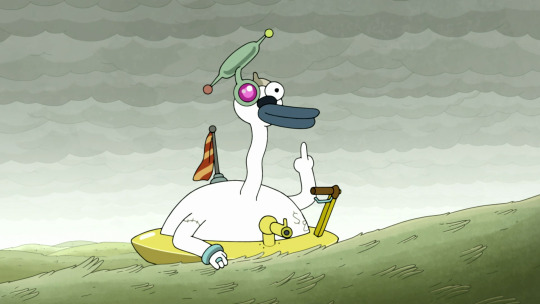
Pawn Swan! This was another character who first appeared in Steve Wolfhard's post-finale loredump about the 1000+ world. I never expected to actually see him in the show.
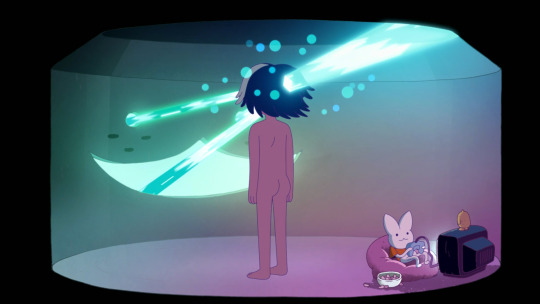
Nuts how this is like the third time we've seen Simon's ass. I love how Shermy is just chilling and playing video games while GOLB lets this random old man take a turn at the wheel.

This establishing shot of Fionnaworld shows that it's very small. By the time it is restored at the end of the episode, this ominous white border is gone and there are more buildings, implying that it became a complete world.
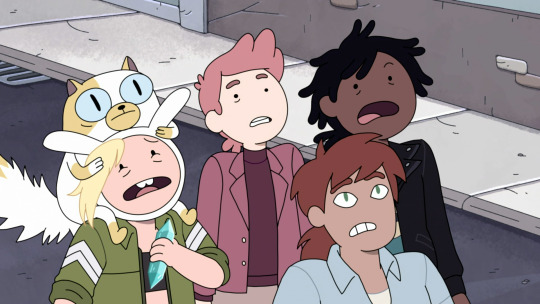
I can't believe Gary was thirsting after Scarab in this situation.
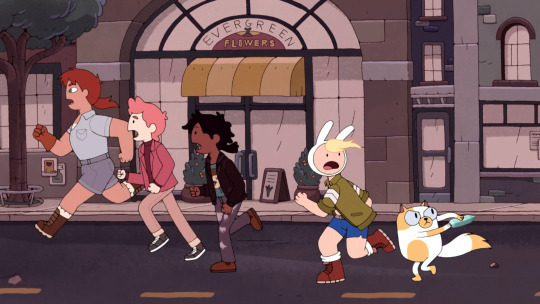
There is a shop called Evergree Flowers; likely a reference to the episode Evergreen.
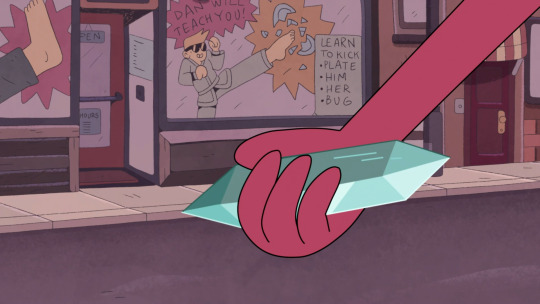
This shop window advertises that you can learn to kick bugs. Appropriately enough, Cake kicks Scarab through this shop window while in her Godzilla form.
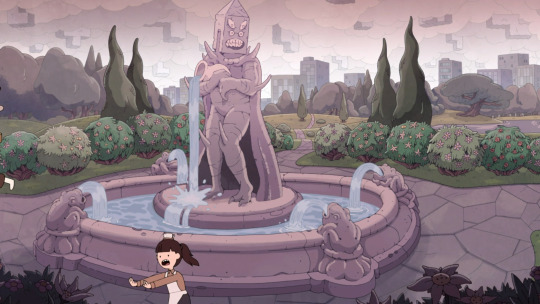
The Betty statue has become GOLBetty.
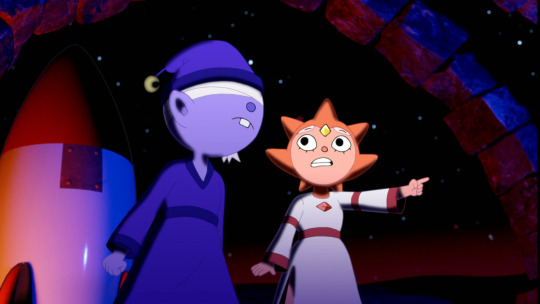
It should be clear by this point that Casper and Nova are a parallel to Simon and Betty, with all of their decisions being made by Casper with little consideration for Nova due to their unbalanced power dynamic. This is why Simon realises that he should have been more considerate of Betty's dreams, rather than single-mindedly chasing the Enchiridion and the crown.
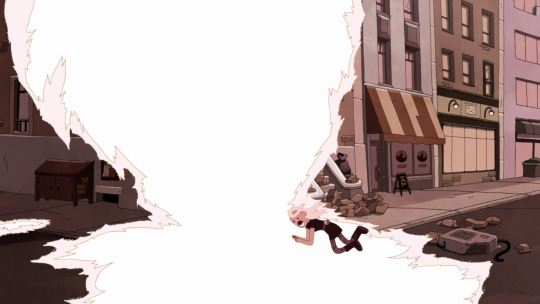
The credits confirm that genderswapped Ash is named Ashley. I wonder what happened to her after she fell into the void. Probably nothing good.
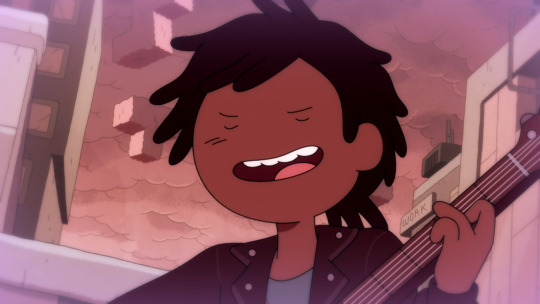
Poor Marshall never gets to finish his songs. Truly he is the genderswapped Marceline.

The name "GOLBetty" is now canon; Simon uses it in this scene.
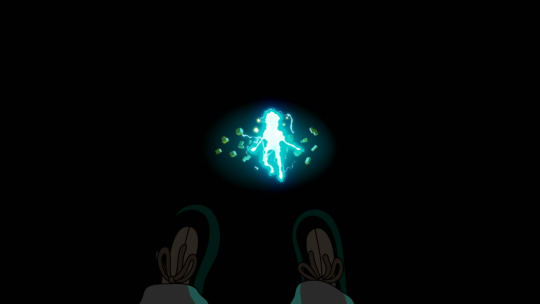
I'm not sure what's happening to GOLBetty here. A loose thread to pick up if this story ever gets a continuation, perhaps.
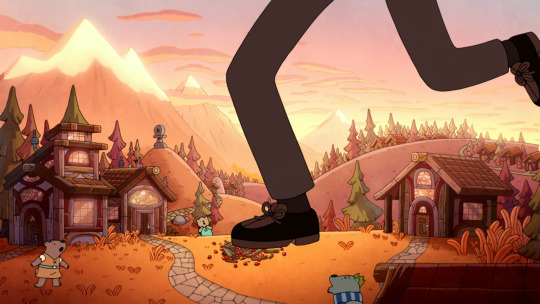
Simon steps through several different universes, including all the ones we saw during this miniseries. I'm not sure what this world full of tiny bears is meant to be.
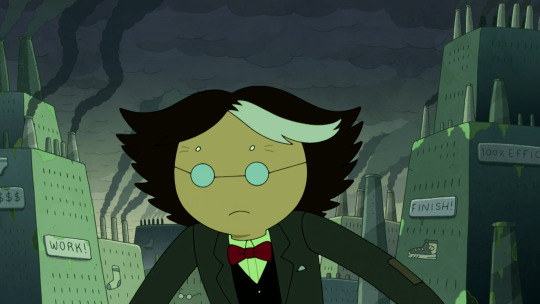
Some kind of industrial capitalist hell universe.

This is the Water Park Prank artstyle, implying that Water Park Prank takes place in a separate but canon universe. So Water Park Prank is now canonically canonical! (what a ridiculous phrase)

Some kind of Jake universe.

A universe featuring Magwood and his volcano lair, from the episode Evergreen.
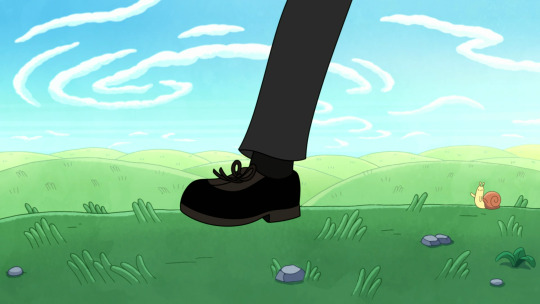
The snail! It's not dead after all. And it's a great way of symbolising a return to regular Ooo, as is the reappearance of the smiley butterfly.

This was a strange selection of characters. I hope Jay hasn't left his younger siblings on their own if their dad is dead. At least baby Finn won't have to grow up in Vampworld, though part of me liked imagining what that would have been like.
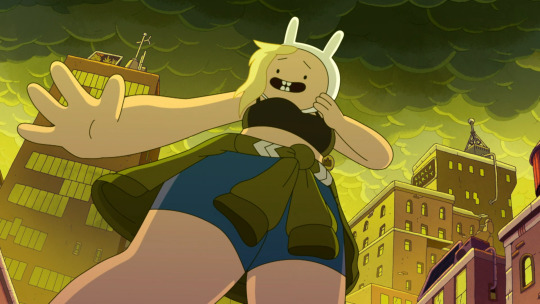
Fionna mentions that his is her top fantasy. The other two of her top three fantasies were Cake being able to talk and a kingdom made of candy.
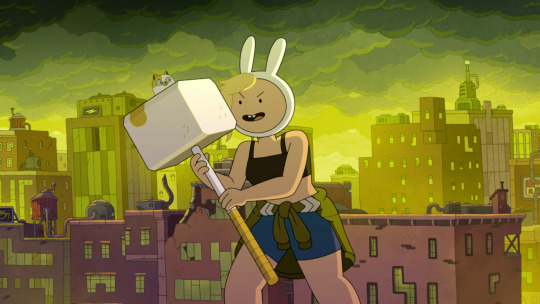
She gets a hammer, like she had in the dream sequence at the very beginning of the miniseries.
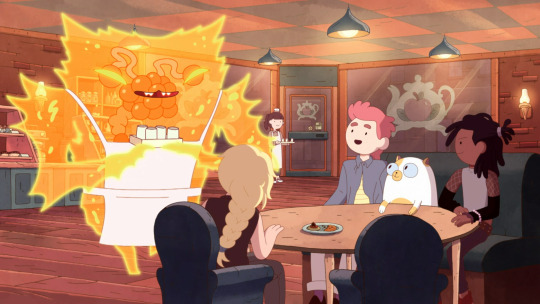
Kheirosiphon goes back to working in a teashop, just like he did on The Drift before he was imprisoned by Scarab. Also Marshall's outfit here is incredibly gay, it's great.
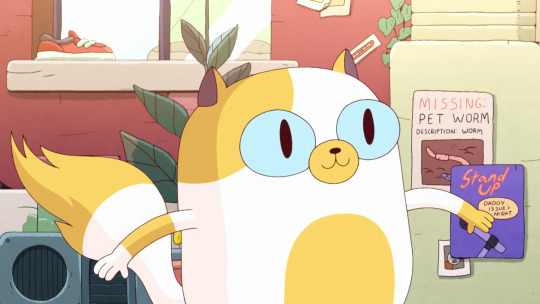
There is an ad here for a daddy issues themed comedy night. Sounds like Marceline's kind of place.

Prismo's face glitches for a second. Ominous.
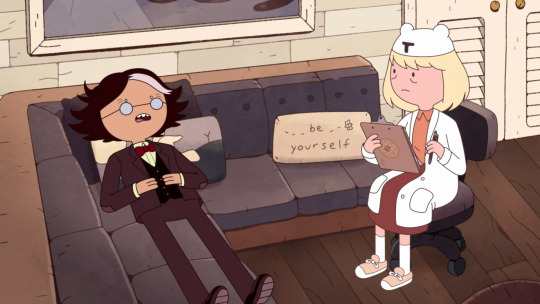
Simon definitely needs to move out. This is probably an even more important realisation than coming to understand his influence over Betty.
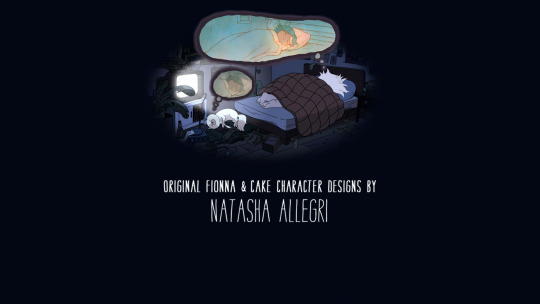
In the credits of this episode, Simon is finally at peace.
And with that, the miniseries is over! Back to the long wait. Will this be it for Adventure Time? Or is there yet more to come...
1K notes
·
View notes